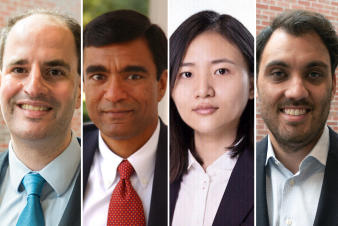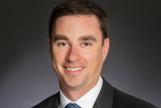The PhD program in Finance at the University of Missouri emphasizes university-level research and teaching skills. The program requires a minimum of 72 credit hours of graduate work beyond the baccalaureate degree. The typical time to complete the degree is four to five years.
The program of study is flexible to accommodate individual student interests. In the first two years of the program, students complete courses in finance, accountancy, economics, and statistics. Following the completion of their doctoral coursework requirements, students take the comprehensive exam. The exam consists of written and oral sections and is typically scheduled prior to the beginning of the fall semester in the third year of study.
The doctoral seminars and comprehensive exam process prepare students to write original dissertations in finance. These dissertations address questions of interest to business executives, asset managers, and economic policymakers. Students also have the opportunity to pursue joint research projects with world-renowned faculty in the Department of Finance.
Students are admitted to the PhD program in Finance on a full-time, residential basis only. Students typically work 20 hours per week as a research assistant or teaching assistant during the academic year. They receive a financial package that includes a stipend, full tuition waiver, health insurance subsidy, and profession development funds. The stipend is no less than $35,000 annually, conditional on funds availability and satisfactory student progress as determined by the department’s review committee.
The PhD program requirements include a sequence of graduate-level courses, written and oral comprehensive examinations, and an original dissertation that contributes new knowledge to the field of finance. The plan of study features the following elements:
- Business foundation courses: 11 credit hours
- Support area and collateral area courses: 30 credit hours
- Finance concentration seminars: 15 credit hours
- Professional development seminars: 4 credit hours
- Dissertation research: 12 credit hours (minimum)
The business foundation includes general business classes offered at the master’s level. This requirement is often waived for students with a prior graduate degree or prior equivalent coursework.
Students customize their plan of study in consultation with their thesis advisor through the selection of support area and collateral area courses. Students must complete two 9-hour support areas and one 12-hour collateral area or one 12-hour support area and one 18-hour collateral area. At least one support area must come from outside the Trulaske College of Business.
Most students choose support areas in accountancy, economics, or statistics. The collateral area requirement focuses on analytical tools, and most students choose a collateral area in econometrics.
The finance concentration requirement includes a sequence of five doctoral seminars covering topics in asset pricing and corporate finance.
Applications must be received by February 1 for full consideration for admission in the fall semester. Earlier applications are encouraged. Admission to the PhD program in finance is highly selective. Applicants should demonstrate a strong record of academic accomplishment, intellectual curiosity, enthusiasm for discovery, and a general understanding of the demands of a doctoral program. Prior academic coursework, research experience, and employment activities in finance are encouraged but not required. We are not able to waive the application fee or the standardized test requirement (i.e., GMAT or GRE) for any applicant.
All PhD students are evaluated annually to assess their progress in the program. The evaluations for first- and second-year students are conducted by the PhD program coordinator. The evaluations for dissertation-stage students are conducted by their dissertation committee chairs.
During the academic year, students are assigned to work as research assistants for faculty members in the department. These assignments allow students to develop proficiency in research methods and often lead to coauthored projects with faculty.
Another important objective of the PhD program is to provide candidates with the opportunity to develop classroom instructional skills. To achieve this objective, doctoral students are assigned to teach undergraduate courses. These assignments require candidates to plan, conduct, and administer one course section per semester. During their time in the PhD program, students typically have the opportunity to teach multiple times. In preparation for the teaching experience, doctoral students are encouraged to attend various teaching-related events sponsored by the Department of Finance, the Trulaske College of Business, and the University of Missouri.
Finance Research at Mizzou
Research Workshop
The Department of Finance hosts a regular research workshop in which leading scholars in the finance profession are invited to the University of Missouri to present their research. Doctoral students are expected to be active participants in these research discussions.
Get to Know Us
Research in the News
Sample Plan of Study
A sample plan of study is provided below. This course sequence corresponds to a student pursuing support areas in economics and statistics and a collateral area in econometrics. Students are able to tailor their own plans of study to their research interests.
Year 1: Fall Semester
- ECONOM 8473: Applied Econometrics
- ECONOM 9451: Advanced Microeconomic Theory I
- ECONOM 9472: Econometric Theory I
- FINANC 9080: Research Methods in Finance
- STAT 8710: Intermediate Mathematical Statistics I
Year 1: Spring Semester
- ECONOM 9452: Advanced Microeconomic Theory II
- FINANC 9080: Research Methods in Finance
- FINANC 9100: Corporate Finance I
- FINANC 9300: Asset Pricing I
- STAT 8720: Intermediate Mathematical Statistics II
In the summer following the first year of study, students are expected to make progress on an independent research project.
Year 2: Fall Semester
- ECONOM 9453: Advanced Macroeconomic Theory I
- FINANC 9080: Research Methods in Finance
- FINANC 9200: Corporate Finance II
- FINANC 9400: Asset Pricing II
Year 2: Spring Semester
- ECONOM 9454: Advanced Macroeconomic Theory II
- ECONOM 9473: Econometric Theory II
- FINANC 9080: Research Methods in Finance
- FINANC 9500: Advanced Topics in Finance
In the summer following the second year of study, students prepare for and take the comprehensive exam in finance. The exam includes a written portion and an oral portion in which students present their own original research to the finance faculty.
Finance PhD Coordinator
BY THE NUMBERS
We graduate 2 students per year on average, and our placement rate is 100%. Most graduates accept initial positions as tenure-track faculty members at research universities. Others pursue opportunities with regulatory and policy-making institutions or financial services firms. A comprehensive list of our recent student placements follows below.
| Year | Graduate | Placement |
|---|---|---|
| 2025 | Kyle Zimmerschied | University of Arkansas |
| 2025 | Esther Im | Washington State University |
| 2025 | Du Nguyen | Bowling Green State University |
| 2025 | Niklas Augustin | Cornerstone Research |
| 2024 | Vishal Sharma | University of Texas-Tyler |
| 2024 | Yang Bai | California State University-Fullerton |
| 2023 | Dat Mai | University of Missouri (Visiting Scholar) |
| 2021 | Ruixiang Wang | Northeastern University |
| 2020 | Ryan Chacon | University of Colorado at Colorado Springs |
| 2019 | Pratik Kothari | Cornerstone Research |
| 2019 | Thibaut Morillon | Elon University |
| 2019 | Khaled Obaid | California State University - East Bay |



